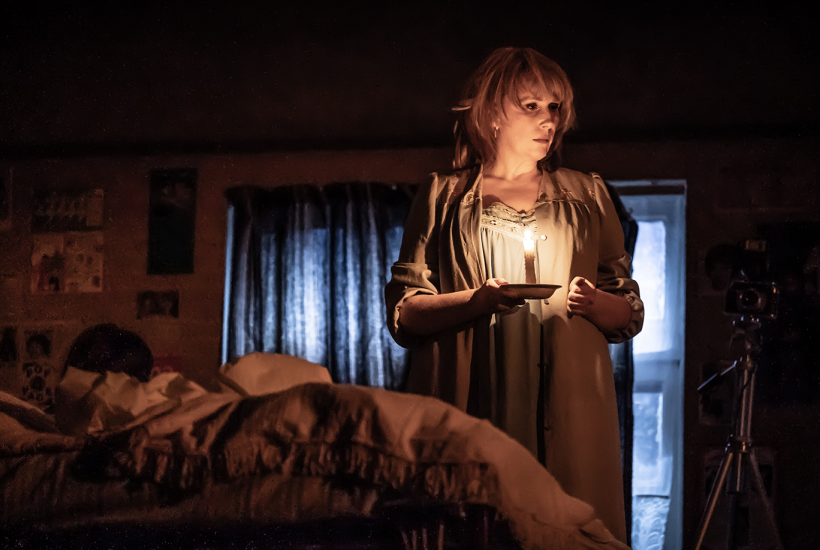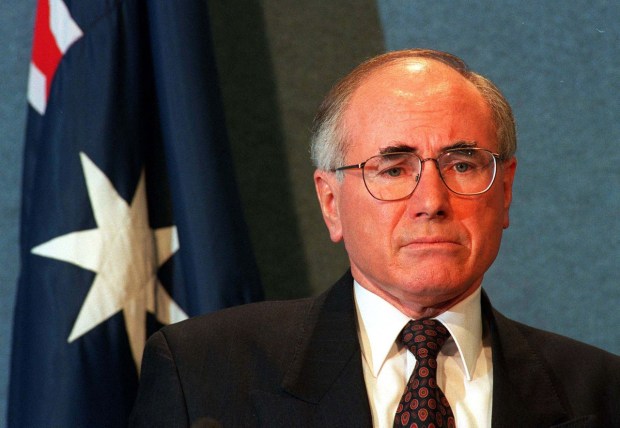The Enfield Haunting is a good old-fashioned horror show that wants to be a documentary as well. It’s based on a hocus-pocus yarn that made the front page of the Daily Mirror in 1977 and was swiftly forgotten. The play opens in an Enfield terrace that resembles a bomb site, complete with charred plasterwork, missing walls and ripped out floorboards. Peggy, a harassed housewife played by Catherine Tate, is struggling to cope with three teenage brats and a ghost that’s got loose in her home. Two ghosts, in fact. Peggy’s daughter, Janet, has been possessed by a demonic spirit that forces her to rasp out nonsense in a hoarse, throaty gurgle, like that annoying girl from The Exorcist. And there’s a mischief-making poltergeist who acts like a disgruntled caretaker, fusing the lights, thumping the furniture, vandalising the gas fire and rattling the tea service.
All in all, it’s not a bad show for a date – if you’re splitting up
But Peggy’s problems have only just started. Rey from next door likes dropping by to loiter in the sitting room near the teenage kids, especially the girls. Shades of Jimmy Savile here, although the drama doesn’t explore Rey’s jailbait fetishes. A second intruder arrives, Mr Gross, who owns a lot of extremely expensive audio equipment which he uses to record the two ghosts as they toss the crockery around and honk out horrible insults through Janet’s sore throat. It’s never clear who invited Mr Gross to stick his microphones all over the house. Then a third ghost joins the gang: a bald old codger with an ashen face keeps strolling across the room whenever the light bulbs blow and darkness descends.
The show contains enough bangs, flashes and nasty surprises to delight fans of the horror genre. But the storyline is impossible to follow because the basic set up isn’t properly explained and the knotty script is crowded with references to people such as ‘Mr Fairplay’ and ‘the Brazilians’ who don’t ever appear on stage. Utterly baffling.
At the curtain call, the actors looked distinctly uneasy about the whole thing. Paul Unwin, the writer, excuses himself in the programme notes. ‘It was my agent’s husband’s idea,’ he says. Clearly he’s putting a lot of distance between himself and this duff collection of flashes and bangs. Audiences will do the same.
Hampstead Theatre has mounted a play by Jonathan Spector who had a hit at the Old Vic with Eureka Day, an enjoyable satire about woke education in America. This Much I Know is a more sombre effort set in an elite US university and it opens with a cocky psychologist setting out several themes at once. First, he delivers a talk on heuristics. Then he tells us that his bicycling wife has left him in mysterious circumstances. A third storyline involves his battle with a student inspired by white supremacist teachings. Plenty of meat there for a drama but the show has barely started.
Next, we’re introduced to Stalin’s tragic daughter, Svetlana, who struggled to play down her father’s legacy after his death. Then we scroll back to the 1930s and listen to a chunk of dialogue between two characters who may or may not be planning on writing a book about the intellectual development of H.G. Wells.
After this, we flit to India where Svetlana’s elderly husband, a Sikh, has to be cremated by her on the banks of the Ganges. In between we get press conferences, pre-recorded phone calls, projections of uncaptioned photographs and meandering chit-chats in airports.
This restless, wordy script feels like a series of sketch ideas chasing each other across the globe in search of a theme. Some critics have mistaken its disunity for profundity and its lack of focus for sophistication. Spector can write brilliantly but what he needs is a friendly editor to give his work focus and direction.
Conor McPherson’s latest attempt to fuse drama and music is set in Poland during the late 1940s. Cold War follows the tale of a disaffected composer, Wiktor, who collects folk songs for his communist overlords. Wiktor loves wild music about devils and romance. One of his favourite tunes celebrates a pig that’s also a hairdresser. But his cheerless Marxist boss wants uplifting music that promotes hard work and new tractors. Wiktor makes off with a pretty young soprano – but he ditches her when his career takes him to glamorous East Berlin.
The sluggish storyline traces his subsequent defection to Paris where he scores movies for annoying American producers and starts a chaste romance with a call girl. The show is strong on looks and it has a powerful atmosphere of unfulfilled yearning and bittersweet romance. But if you like intensity, jokes and pace, look elsewhere. Ex-smokers be warned that the actors chug away non-stop on herbal cigarettes that reek of burnt trampoline. In all, it’s not a bad show for a date – if you’re splitting up.
Got something to add? Join the discussion and comment below.
You might disagree with half of it, but you’ll enjoy reading all of it. Try your first month for free, then just $2 a week for the remainder of your first year.








